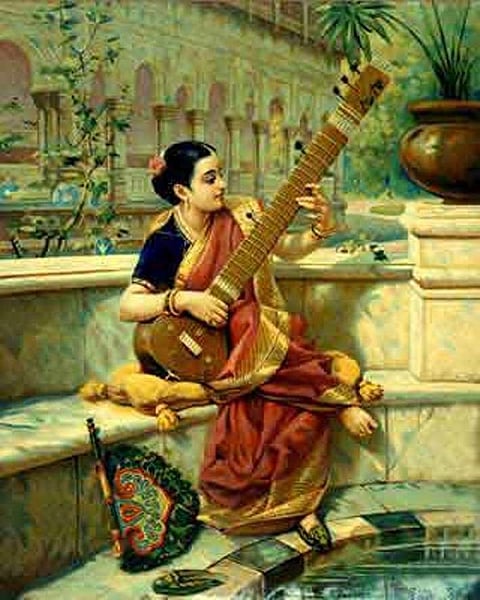
- Home
- न्यूजग्राम
- India
- World
- Politics
- Entertainment
- Culture
- Lifestyle
- Economy
- Sports
- Sp. Coverage
- Misc.
- NewsGram Exclusive
- Jobs / Internships

The Vedas and Hindu manuscripts have predominantly stated stories of powerful men and their victories. The women in the Upanishads never seemed to be in the limelight. The society embraced only male characters in every field of life be it the Gods, teachers, students, or even authors.
However, the status of women in the Upanishads has not been disgraced and demeaned. It has been found in the Brihadaranyaka Upanishad where the fifty male teachers bear the names of their mother as their last name. This describes that though men ruled the society they held the women in the Upanishads era with high respect. The Upanishads saw the references to the wives of spiritual teachers who participated in debates and discussions.
Various Hindu Scriptures describe Women in the Upanishads being dominated by Male. Wikimedia.
There is also mention of few women in the Upanishads such as Gargi, Maitreyi, Jabali, Usati Chakrayana's wife, Uma Haimavati, Janasruti's daughter, Satyakama Jabala's wife who made an extraordinary and inspiring life, though being subdued under the male dominance in the ancient era. Below are some identified roles of the women in the Upanishads who made a remarkable history in the ancient world.
The Chandogya Upanishad mentions how women in the Upanishads were represented in the form of a respectful story of understanding, sacrifice and caring relationship between an erudite husband and an ordinary housewife going through a difficult stage in their lives. Usita Chakrayana had brought some leftover beans for his virgin wife who probably did not eat anything on that day, yet she kept them for her husband for the next day. This depicts a strong lovable bond of affinity which helped them go through the hardships together. The women in this story played a significant role in supporting the man of her life while the men cared her feelings as well.
Women in the Upanishads era were considered for Procreation only. Wikimedia.
Men like Yajnavalkya engaged their wives to share wisdom and discuss philosophical issues. This represents that though the status of women in the Upanishads has been structured as slaves or servants in the house, men did not restrain women from entering into debates and discussions. Of course, there was no coercion in doing such activities. Maitreyi, Yajnavalkya's wife was interested in the deeper wisdom of Self and Yajnavalkya spoke to her only about it whom he considered not only as a wife or a woman but the immortal Self and loved her for that.
Women in the Upanishads of the ancient era were not only subservient to their husbands but also to their fathers' before being married. This tradition had been continuing in India until the last century. The dowry system in Hindu society is an evil in the modern day and is considered against the law in legal terms. The Upanishads had enough stories to prove this fact where the father's decision over his daughter's marriage was binding on her. The consent of the women was never considered for marriage. She was used as a mere barter against deal or trade purposes.
In Chandogya Upanishad, there is an interesting story about a rich man named Janasruti who desired to acquire knowledge from a greater man than him known as Raikva. After denial of various expensive gifts, Janashruti gave his beautiful daughter as a gift to Raikva in exchange of knowledge. In today's generation, people would neither hold Raikva nor Janasruti, in great esteem, but ancient tradition considers them as impeccable men.
The status of women in the Upanishads has been symbolized in the Mahabharata as a responsible, caring and dutiful wife of a man. Not only this, women also gave counsel to their husbands and took interest in their professional duties and activities. The Chandogya Upanishad has an engaging story of Upakosala, a student of the famous Vedic sage, Satyakama Jabala. Upakosala had worked hard for 12 years to please his master and learn from him the secrets of fire sacrifice with determination. But Satyakam was not satisfied and he remained harsh to him and went away. Fortunately, the domestic fires took pity and taught him the knowledge before Satyakama returned. Satyakama's wife had helped the student go through his hard life. The incident proves that the wife of a teacher did not share any teaching responsibility with her husband but had an important role in the welfare of the student as a guardian mother and did not hesitate to interfere.
The women in the Upanishads were meant as a Dutiful Wife. Wikimedia.
Not all women in the Upanishads were enforced to perform household duties to their husbands. It was the women's choice to live freely or within the boundaries. History is proof of Satyakama Jabala's mother who was a free-spirited and independent woman. She used to work as a maid and had various relationships in her younger days. After the birth of Satyakama, she lived as a single woman without the bondings of a traditional family. Thereby, the concept of illegal marriage and sex, single parenting and unwed mothers have known in ancient era also.
-Prepared by Bhavana Rathi of NewsGram. Twitter @tweet_bhavana
